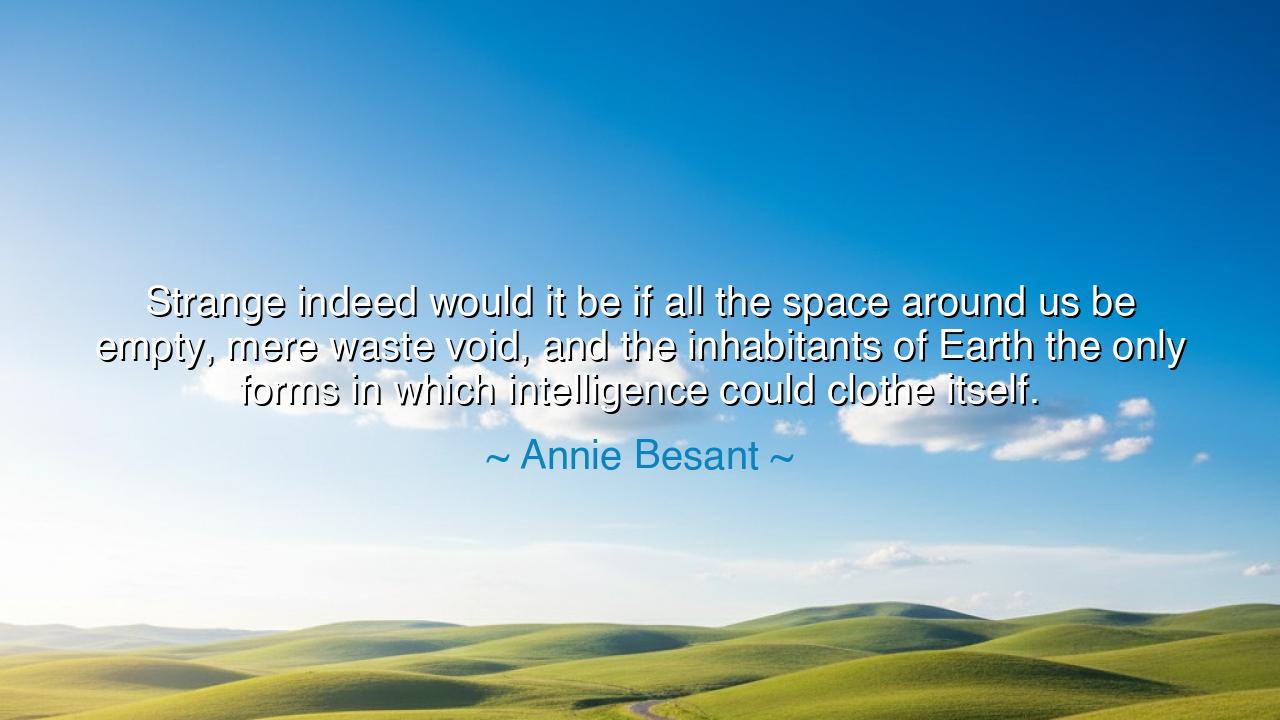
Strange indeed would it be if all the space around us be empty
Strange indeed would it be if all the space around us be empty, mere waste void, and the inhabitants of Earth the only forms in which intelligence could clothe itself.






“Strange indeed would it be if all the space around us be empty, mere waste void, and the inhabitants of Earth the only forms in which intelligence could clothe itself.” – Annie Besant
In these words, Annie Besant, the great mystic and philosopher of the Theosophical age, calls us to lift our gaze beyond the narrow circle of our world and contemplate the vast and living mystery of the universe. Her voice, steeped in wonder, challenges the arrogance that would confine intelligence to the fragile vessel of human form. For she saw the cosmos not as a barren expanse of dust and darkness, but as a temple of consciousness, where life in countless guises unfolds, each reflecting the infinite mind of the Divine. To believe that only Earth holds thinking beings, she said, would be to imagine a palace with but one room lit, while all the others lie empty — a folly unworthy of the grandeur of creation.
Besant was not a dreamer lost in fancy. She was a scholar, a reformer, and a spiritual pioneer, who sought to bridge science and the sacred. When she spoke of space not as void but as fullness, she echoed both ancient wisdom and modern reason. The sages of India spoke of Ākāśa, the subtle ether that breathes through all existence, the womb of all forms and energies. The mystics of Greece whispered of Nous, the living mind of the cosmos. And now, even the astronomers of our age, with their telescopes and their patient eyes, peer into the endless dark and find there not emptiness, but worlds upon worlds, galaxies upon galaxies, light scattered like the dust of eternity. Truly, strange indeed would it be if such immensity were sterile, if only this small planet should think, dream, and yearn.
Consider, then, the lesson of Giordano Bruno, a philosopher of the sixteenth century who, long before Besant, dared to proclaim that the stars were suns like our own, each perhaps encircled by worlds filled with life. For this vision — for declaring that intelligence may clothe itself in infinite forms across the heavens — he was condemned by men whose minds were bound to the narrow Earth. He was burned, but his truth endured. His spirit, like fire, leapt from the stake into the ages to come, and his words found their echo in the discoveries of modern science. His courage teaches us that truth often wears the robe of heresy, and that to imagine freely is itself an act of reverence toward the divine order of things.
Besant’s insight is more than a speculation about life beyond the stars. It is a revelation of the unity of being. If intelligence can take form not only in man, but in every sphere and system, then consciousness itself is the essence of the universe — and we are but one expression among many. To see ourselves as the sole inheritors of thought is to separate ourselves from the greater family of existence. But to perceive the cosmos as alive with mind and purpose is to awaken a humility that ennobles, a reverence that uplifts. Then no star is distant, no creature foreign, for all are sparks of the same eternal flame.
And what of emptiness, that dread word which haunts the heart of the modern man? Besant’s teaching dissolves it. There is no emptiness in a universe alive with energy, thought, and love. The apparent void between the stars is not waste — it is the breath of the Infinite, the field where creation dances unseen. To her, the silence of the heavens was not the silence of absence, but the quiet pulse of a consciousness too vast for words. When we look upon the night sky, we should not see isolation, but communion; not darkness, but a deeper light waiting to be known.
The lesson that flows from this vision is simple yet profound: Expand your sense of life. Do not imagine that intelligence ends with human reason, nor that beauty is confined to Earth’s small garden. Cultivate a mind wide as the stars — a mind that listens, wonders, and respects the unknown. Let curiosity be your prayer, and awe your worship. When you look up at the heavens, do not ask only, “Are we alone?” but rather, “How vast is the family to which we belong?” In that question lies the seed of wisdom, the beginning of true understanding.
So let this be the teaching carried forward: The universe is alive, and we are threads in its boundless tapestry. To know this is to walk humbly and joyfully among the mysteries. Seek knowledge, but also cultivate wonder. For intelligence, whether human or cosmic, is sacred only when it bows before the infinite — and in that reverence, man becomes not the ruler of creation, but its conscious participant, its luminous witness among the stars.






AAdministratorAdministrator
Welcome, honored guests. Please leave a comment, we will respond soon